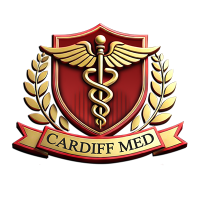Dermatology in Clinical Practice MSc – USW
Enhance your dermatology practice with the MSc at USW. Learn advanced clinical skills and evidence-based care from industry experts.
Overview
The MSc Dermatology in Clinical Practice (USW), offered in collaboration with the University of South Wales, is a flexible, part-time online course for busy clinicians. Ideal for GPs, nurses, and pharmacists, this RCP-accredited program deepens clinical knowledge, enhances practical dermatology skills, and offers internationally recognized qualifications. Taught by leading experts, the course empowers students to deliver evidence-based care and achieve greater professional recognition while balancing their current practice.
Entry Requirements
Since our courses are conducted entirely online, they are accessible to both UK and international registered healthcare professionals.
Applicants typically hold a first degree or equivalent (including international qualifications) in a relevant professional healthcare field, such as a medical or nursing degree.
Registered healthcare professionals without these recognised qualifications will be considered on an individual basis, and a wide range of prior experience may be taken into account. In some cases, applicants may be asked to submit a piece of work for assessment to confirm that they are able to work comfortably at postgraduate level and demonstrate the requisite clinical and professional knowledge.
- A copy of your updated CV including your address and date of birth.
- A copy of your undergraduate degree certificate.
- The name and email address of someone who is able to provide a reference, this can be a work colleague, employer or former tutor.
- A detailed personal statement explaining why you would like to undertake the course.
- A copy of your proof of English competency (see below).
Proficiency in the English language is also essential to completing our courses. If English is NOT your first language, we ask for proof of competency during the application process. We are able to accept an IELTS (with an overall score of 6.5 and a minimum of 6.0 for each band) or an equivalent qualification.
If you do not meet these requirements, please don’t worry, you can also contact our admissions team on admissions@cardiffmed.com for more information on the qualifications we accept.
Should you have already successfully completed the 1 year Postgraduate Diploma and wish to convert to the MSc and complete only the second year of the program this is possible. Please contact our admissions department info@cardiffmed.com to find out more.
Key Facts
- University of South Wales
- Starting Date: 1st September 2025
- Application Deadline : 29th August 2025
- Class Size : 15 - 20
- Duration : 24 months
- Commitment : Part-time
- Format : 100% Online
Course Fees
- Deposit for September 2025: £460 †
- Total Course Fees for UK & International Students for September 2025: £9,920 ††
Payment Options
- Option 1: Upfront Payment in full. Pay-in-full discount is available.
- Option 2: Apply for Interest-free payments each month for the duration of the course.
Payment Plan Breakdown
First Year Payments
| Deposit | 10 Monthly Payments | Final Payment |
| £460 † | £460 | £460 |
Total first year payments: £5,520
Second Year Payments
| 11 Monthly Payments | Final Payment |
| £366 | £374 |
Total second year payments: £4,400
You may also be interested in:
- Spread the cost with Lendwise, who offer financing options for up to 8 years. ††††
† Deposits are non-refundable
†† Prices are subject to review following each intake
†††† Subject to eligibility criteria.
Course Modules and Learning Outcomes
The Dermatology in Clinical Practice MSc is a two-year course, consisting of eight modules (180 credits) with the first 120 credits deriving from the Postgraduate Diploma. The second year of the Dermatology MSc course starts with an initial 10-week online module that will develop skills in critical appraisal and knowledge of research methodologies. Students then complete the professional project module, which consists of a 1,500-word proposal and a 10,500-word professional project (dissertation).
Year 1
Module Aims
To develop a critical understanding of the description of dermatological conditions, referral pathways, imaging and management.
Module Content
- The language of dermatology
- Therapeutics
- Drug eruptions
- Vasculitis
- Cutaneous manifestations of systemic disease
- Guidance, teledermatology and the multi-disciplinary team
Learning Outcomes
- Resolve diagnostic conundrums and institute appropriate management strategies in relation to systemic disease, side effects of drugs and vasculitides.
- Demonstrate acuity in using health care resources for the benefit of the patient in such areas as the role of the multidisciplinary team, referral pathways and evidence-based, guidance in dermatological conditions.
Module Aims
To be able to describe, diagnose and interpret the management of skin lesions in the context of guidance.
Module Content
- Skin lumps and bumps
- Benign skin lesions
- Non-melanoma skin cancer
- Melanocytic Naive melanoma
- Surgical Approach to Skin Disease
Learning Outcomes
- Differentially diagnose a wide variety of skin lesions.
- Differentiate between benign and malignant lesions and an understanding of the appropriate referral pathway and treatment guidance.
- Critical appraisal of the evidence relating to the management of skin lumps and bumps.
Module Aims
To accurately describe, identify and institute an appropriate management strategy for dermatoses at specific areas of the body.
Module Content
- Facial rashes
- Nails
- Scalp and hair
- Perineal dermatoses
- Flexural dermatoses
- Palmar and plantar dermatoses
Learning Outcomes
- A critical understanding of the predilection for common dermatoses at various sites of the body.
- An ability to solve diagnostic conundrums relating to regional dermatoses.
- An ability to formulate an appropriate management plan for site specific dermatoses utilizing evidence.
Module Aims
To accurately describe, identify and institute an appropriate management strategy for inflammatory dermatoses.
Module Content
- Differential diagnosis of inflammatory dermatoses
- Atopic eczema
- Contact dermatitis
- Psoriasis
- Urticaria
- Bullous eruptions
Learning Outcomes
- A critical understanding of the evidence relating to common inflammatory skin conditions.
- An ability to solve diagnostic conundrums relating to inflammatory dermatoses.
- An ability to formulate an evidence-based management plan for common inflammatory dermatoses.
Module Aims
To be able to describe, diagnose and interpret the management of skin infections in the context of guidance.
Module Content
- Differential diagnosis of skin infections
- Cellulitis and ulceration
- Infestation
- Infection related to systemic illness
- Phot dermatoses
Learning Outcomes
- A critical awareness of the evidence basis for the identification and management of common skin infections/infestations/phot dermatoses.
- An ability to develop and decipher a differential diagnosis for skin infections/infestations/phot dermatoses.
- A critical awareness of the appropriate management strategy and referral pathways for infections/infestations and phot dermatoses.
Module Aims
To develop an ability to identify common skin disorders in particular subgroups of the population and to understand the specific treatment pathways
Module Content
- Infant skin
- Acne and adolescent skin problems
- Pigmented skin
- Elderly skin
- Anti-aging
- Cosmetic treatments
Learning Outcomes
- A critical awareness of the evidence basis relating to the identification and treatment of common skin disorders in various populations.
- An ability to develop and decipher a differential diagnosis for common skin diseases affecting specific populations.
- A critical awareness of the appropriate management strategy and referral pathways for individuals from sub-groups of the population.
Year 2
Module Aims
To prepare students for an independent research-based project by developing skills in selecting, appraising, discriminating, using evidence and appropriate research/investigative methods to address relevant topics for investigation.
Module Content
- Terminology used in epidemiology and research studies such as prevalence, incidence, sensitivity, specificity, false positive and false negatives.
- Interpreting graphical representation of epidemiological and statistical data such as Kaplan-Meier Curves, Forrest Plots and Meta-analyses.
- Calculations used in the assessment of research data such as relative risk, absolute risk, number needed to treat.
- Basic statistical tests and their applications including t-Tests, ANOVA, Chi-Square.
- Methodologies as applied to interdisciplinary and multidisciplinary pain management research.
- Principles of evidence-based practice and its application into the clinical setting.
- Research into educational principles for both healthcare practitioner and patient.
- Understanding what may work for the patient as well as the educator.
Learning Outcomes
- Critically analyze and interpret research to assess its application to delivery/service development.
- Evaluate and synthesize diverse methodological approaches and research tools to formulate and investigate complex questions within your field of practice.
Module Aims
- To formulate the research question that you seek to answer.
- To develop an ability to critically evaluate areas of professional practice.
- To critically appraise specific areas of clinical, research and organizational practice.
- To develop skills in independent research and study.
- To develop skills relevant to scientific publications.
Module Content
The module will depend on the creation of a piece of work based upon a specific clinically related project relevant to the student’s practice. This project may comprise:
- Literature review and appraisal of the evidence.
- Audit of practice including organizational or clinical.
- Review and implementation of evidence-based practice.
- Qualitative or quantitative research (formal research involving human subjects is not anticipated).
- Case-based and quality of service review with critical appraisal.
- Case report, review of literature and organizational assessment.
Learning Outcomes
- Synthesize advanced knowledge of dermatology research to conceptualize, plan, and execute an original investigation that contributes significant insights to the field.
- Critically evaluate practice and suggest improvements or change in a dermatology setting.
- Incorporate knowledge of the research process in developing services appropriately.
Programme Leader
The hospital plays a statewide services includes the Acquired

Prof Christian Aldridge
Programme Leader
BSc (Hons), MBChB, MRCP Consultant Dermatologist, Prince Charles and Royal Glamorgan Hospitals

Prof Christian Aldridge
Programme Leader

Dr Cecilia Grossmith
Tutor
Dr Grossmith's work is in secondary care largely skin cancer diagnostics and treatment

Dr Cecilia Grossmith
Tutor

Dr Deepa M.L Hemnani
Tutor
She has been involved in teaching responsibilities of undergraduate and dermatology residents

Dr Deepa M.L Hemnani
Tutor

Dr Michael Boffa
Tutor
As Consultant Dermatologist, Dr Michael Boffa's regular duties include outpatient clinics in General & Paediatric Dermatology,

Dr Michael Boffa
Tutor

Dr Thomas King
Tutor
Validated and Supported by Trusted Institutions
Validating partner
The University of South Wales (USW
Accreditors and Endorsers
Assessment Methods
This programme emphasises learning through active participation in case-based discussions, reflection, and real-life scenarios. Students engage with clinical cases that mirror everyday practice, fostering problem-solving and evidence-based application from the very beginning.
Across the modules, assessments are integrated with learning. Each week, you will work through two to three clinical cases, discussing and reflecting on them with peers under the guidance of an expert tutor. These discussions form the core of your learning and are also the basis for your assessments.
Our innovative teaching methods are designed to help you translate this learning into real-world clinical practice. You’ll need to regularly log in to participate in discussions, ideally daily, and commit approximately two hours per day to your studies. Our dedicated Student Support Team is available to assist with any challenges you may encounter, from navigating our online platform to managing deadlines.
How Foundational Knowledge is Developed
The programme is structured so that foundational knowledge is introduced through carefully designed clinical cases. Each case is crafted to highlight essential concepts and progressively deepen your understanding as you apply critical thinking and evidence-based analysis. This hands-on approach ensures that you are not only acquiring theoretical knowledge but also learning how to apply it in a practical, clinical setting.
This programme is suited for professionals who thrive in an online, discussion-based learning environment. Please note that this course focuses on interactive, applied learning through peer collaboration and case discussions. You will be fully supported, encouraged, and led through the programme to success and graduation!
Year 1
- Every week students are presented with two/three clinical case-based scenarios that are reflective of every day clinical practice and research.
- Tutors will post a number of questions and prompts to aid students in a formal discussion of each case.
- These discussions are facilitated throughout by your tutor and are then assessed at the end of every module.
For this assessment, students will work on a group assignment and/or an individual assignment.
- Group assignments are designed to hone skills in the multidisciplinary, holistic approach to modern treatments and patient management by requiring group participation in a single piece of work.
- Individual assignments are designed to hone skills in academic career progression through such tasks as reviewing papers, developing scientific posters or abstracts, peer-reviewing, social media activities, patient information leaflets and essays.
The reflective journal is used by students throughout each module to monitor personal progress. This is guided by weekly feedback from your tutor and is graded at the end of every module. The journal typically includes the following:
- Initial expectations and reasons for taking the course.
- Module and/or personal learning objectives.
- Description of events, issues and learning points within current personal practice.
- Change in every day practice due to knowledge gained on each module.
- A description of what has been learned during the module.
- Students are provided with case-based problems in the form of a one-hour timed examination.
- The exam consists of 30 'Single Best Answer' questions.
- Students are required to complete the exam online within the set time.
Why Study Dermatology in Clinical Practice Master's with CardiffMED
100% Flexible
Our courses are 100% online. No fixed study times mean you can log in and learn whenever and wherever.
Multidisciplinary – study in a group of doctors, nurses, pharmacists and other healthcare professionals.

Career Boosting
Get a University-validated postgraduate qualification in just 1 calendar year instead of 2 academic years.
40% of our alumni reported a salary increase 2 years after studying with us.

Expert Led
All of our programmes are authored and developed by world-leading experts in their field.
Our faculty are selected due to their subject expertise, experience, and teaching abilities to ensure the highest standards of educational excellence.

Our MSc dermatology is applicable to all GPs, Practice Nurses, Specialist Nurses and Pharmacists exposed to patients with dermatological conditions.
You'll learn through our flexible, interactive online platform, which allows you to engage with clinical cases, complete assignments, and collaborate with fellow students at times that suit your schedule. There's no fixed timetable—simply log in daily to participate in the week's activities.
Our teaching approach is highly interactive, using small groups of 10-20 students to foster a collaborative environment where you can engage in thoughtful discussions and receive guidance from your tutor. You'll have access to learning resources and discussion forums that encourage ongoing interaction and deeper engagement with the material.
Throughout your studies, you'll receive support from a dedicated expert tutor and our Student Support Team, ensuring you have the resources needed to navigate the course successfully.
Why Enroll in This Program
Awarding University
University of South Wales
Why CardiffMED for Dermatology MSc?
CardiffMed, in collaboration with the University of South Wales, delivers high-quality dermatology education tailored for working professionals. With expert-led teaching, flexible learning, and global recognition, we’re committed to your clinical growth.





